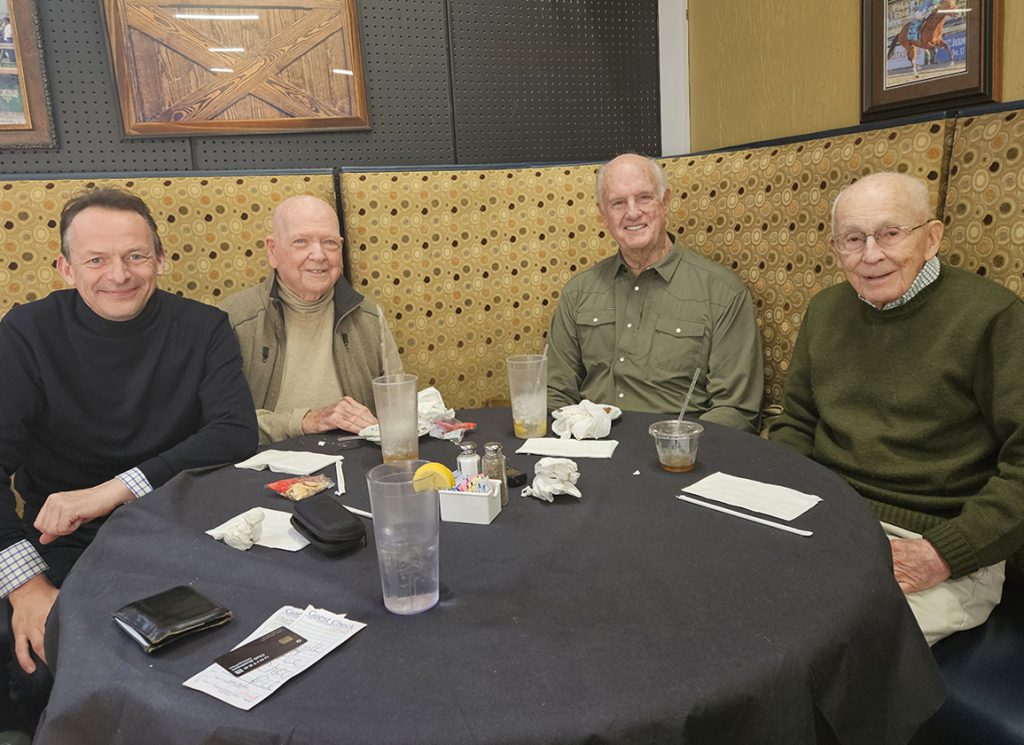For me personally, what a weird coincidence that earlier this week, TDN published a wonderful essay by its columnist Chris McGrath, who spent time with three of the industry's “elder statesman,” among them Ercel Ellis.
For it was Ellis who, 40 years ago this coming week, made a decision that altered the course of my life.
McGrath obviously had a wonderful time at Lil's Coffee House in Paris, Ky., listening to the yarns spun by Ellis, now 92, renowned veterinarian Bob Copelan (97), and the youngster of the trio, Stone Farm owner Arthur Hancock (81).
Forty years ago, when I was a mere 25 and Ellis 52, he decided to leave his position as breeding columnist for Daily Racing Form to train a small string of horses he and his wife owned.
I was interviewed by Logan Bailey, who managed the small Daily Racing Form office in Lexington, and was offered the position Ellis was vacating.
While Ellis grew up on Dixiana Farm–which his father managed–and had a wealth of knowledge about Thoroughbreds, my initial foray into the industry was as a handicapper (something I still enjoy today).
Now any good handicapper inherently learns about pedigrees, but, honestly, I knew very little at the time about such topics as breeding and sales.
During the interview, Logan (now deceased) asked me if I could spend time with any one person who would it be. I guess most people answer with the president, or an astronaut, or the Pope … I don't know. I said Secretariat.
There were only four persons in the DRF office, which was located in the Keeneland clubhouse, in some of the track's original stalls. I often wondered what horses had stabled where I now had my desk and typewriter.
I started the Monday after the Kentucky Derby, and that timing was also interesting. Because I had said I wanted to meet Secretariat, Logan had arranged for me to visit Claiborne Farm and do just that. The week after the 1984 Derby was special at Claiborne because the Derby winner, Swale (Seattle Slew–Tuerta, by Forli), was bred by Claiborne and raced by the farm in partnership with William Haggin Perry, Peter Brant and Edward Cox Jr.
Here I was, just a few days after the Derby and new at my job, being shown not only Secretariat, but the incredible roster of stallions, by farm managers John Sosby and Gus Koch.
That day, I briefly met farm president Seth Hancock, with whom I had numerous subsequent conversations over the years.
Of course, the story of Swale ended up being bittersweet. He also won the GI Belmont S. for trainer Woody Stephens, but eight days later collapsed and died. Though no definitive cause was determined, an autopsy discovered lesions in the heart area which could have been responsible for his death.

Chris McGrath, Ercel Ellis, Arthur Hancock and Dr. Robert Copelan | courtesy of Chris_McGrath.
When Secretariat died Oct. 4, 1989, Logan informed me we would be allowed to attend his burial at Claiborne. But, the following morning, farm officials decided not to allow press members. We always respected that decision.
I have seen Ercel only a few times over the years. But it is always a wonderful experience for me when I do because he has as encyclopedic mind when it comes to Thoroughbreds, able to recall races and pedigrees as if it were yesterday.
I was truly honored a number of years ago when Ercel phoned and asked me to be interviewed on his radio show. I will never forget that 15 minutes.
During my 25 years regularly covering racing and breeding at Daily Racing Form, The Racing Times and The Blood-Horse, Ercel is an example of those I always jumped at the chance to spend five minutes or five hours with–such as Bob Green, Bob Courtney, Henry White, Warner Jones, Carter Thornton, Alice Chandler, Ted Bassett, Gail Hughes, Brereton Jones, Johnny Griggs, Bruce Hundley, Johnny Jones, Charlie Nuckols… and countless others–because though green when I started, I became fascinated with the history and intricacies of the industry.
It is hard to believe I was 25 when I started at Daily Racing Form and Ercel Ellis was 52. Now, I have recently started Medicare and Ercel is 92.
Where would I be had Ercel Ellis not left Daily Racing Form? Yogi Berra said, “When you get to a fork in the road, take it.”
Because of Ercel, there was a fork in the road, and I took it.
I just hope those starting in the business today will find mentors not only as knowledgeable as those I was fortunate to have, but as willing to share their knowledge.

The post Letter To The Editor: Ercel Ellis and The Decision That Altered My Life appeared first on TDN | Thoroughbred Daily News | Horse Racing News, Results and Video | Thoroughbred Breeding and Auctions.
Source of original post

